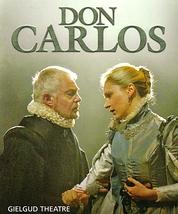Don Carlos
Derek Jacobi holds court at the Gielgud as King Philip II in Mike Poulton's deft adaptation of Friedrich Schiller's 'Don Carlos'.
Philip II governs Spain and his empire with an iron fist and the aid of the Inquisition. Freedom of expression is frowned upon as a crime against the state, nature and the church. Philip's son Don Carlos, with his friend Rodrigo, dream of a more liberal Spain, and this inevitably leads them into conflict with not only the king, but with his courtiers and finally the church's inquisition.
The clash between father and son is not just one of ideology, but also of love. Carlos is in love with the King's young queen Elizabeth, a woman he had formally been betrothed to before his father decided to marry her. This deadly mixture of intrigue, jealousy and betrayal, all played out under the watchful eyes of the Cardinal Grand Inquisitor, inevitably leads to bloodshed.
Derek Jacobi dominates throughout in a performance that extrudes power, tyranny and a growing fear of madness. When he states, "The instrument God places in my hand is terror", you have no doubt that not only does he believe this, but also that his unyielding dogmatic creed demands that he acts upon it. And it is with this unyielding demand that Jacobi creates a king that is not only to be feared, but also pitied. His Philip II is tinged by sorrow at his inability to love or be loved, "My soul has never been touched", he bemoans in a dreaded moment of introspection. When the king's confessor says of humanity that it is a "terrible disease', one senses that there is a humanity to Philip that has been placed in bondage to a tyrannical god - a bondage that Philip fears is sending him mad.
Richard Coyle portrays the hopelessness felt by Don Carlos, the young prince, and the intensity to his anguish captures the pain felt by this royal family in crisis. However, I found it difficult to imagine that this whimpering, forlorn young man was ever a visionary of freedom. It is therefore surprising that Rodrigo, energetically played by Elliot Cowan, puts so much faith in the prince and is willing to sacrifice himself, if necessary, in order to save Carlos from the devious plots of his father's court.
The heroism with which Rodrigo sets out to re-invigorate the ideal of religious freedom in Carlos, means it is difficult to see the real issues at stake: love, compassion and hope as opposed to conformity and a cruel loyalty to religious duty. It is left to Claire Price's Queen Elizabeth to bring these values to the surface, which she does magnificently. When she challenges the King's mistrust and attacks him for his jealousy and lack of love for his son, she forces Phillip to face up to the emotionless monster he has become. When he strikes her, it is out of grief for what he has lost and not merely out of anger that she dares to confront him.
The whole ensemble perform well, especially Ian Hogg as the Duke of Alba, whose facial expressions amply portrays his perplexity at the king's apparent 'weakness', and the disappointment he feels for not being rewarded for his loyal service. Peter Eyre gives a terrifying performance as the blind Cardinal Grand Inquisitor; he stalks the stage like a putrefying bloodhound from hell, waiting to feed upon the helpless victims of his inquisition.
Christopher Oram's design sets the stage for this frightful drama, a large static barren stage that resembles both a prison and a monastery. The walls lack any vestige of art, culture or human creativity, thus abruptly expressing the dark oppressive ideology that enshrouds this play's inhabitants, which leaves only shafts of light from the outside world to soften the harsh environment.
Yet into this barren space director Michael Grandage brings to life a powerful drama, one that speaks to us today of the danger of religious intolerance, an intolerance that worships duty and conformity whilst demonising love and creativity.
(Alan Bird)
Email: alan@londontheatre.co.uk
What other critics had to say.....
NICHOLAS DE JONGH for THE EVENING STRANDARD says, "There have been few occasions in my theatregoing life when I have been more comprehensively thrilled." MICHAEL BILLINGTON for THE GUARDIAN says, "What makes it a great play is that Schiller espouses freedom while understanding power. And if any one performance dominates the evening it is Derek Jacobi's superb Philip II. " BENEDICT NIGHTINGALE for THE TIMES says, "...gripped, shaken and privileged to enjoy what is, I believe, a great performance?"
External links to full reviews from popular press
The Times
The Guardian
Originally published on
